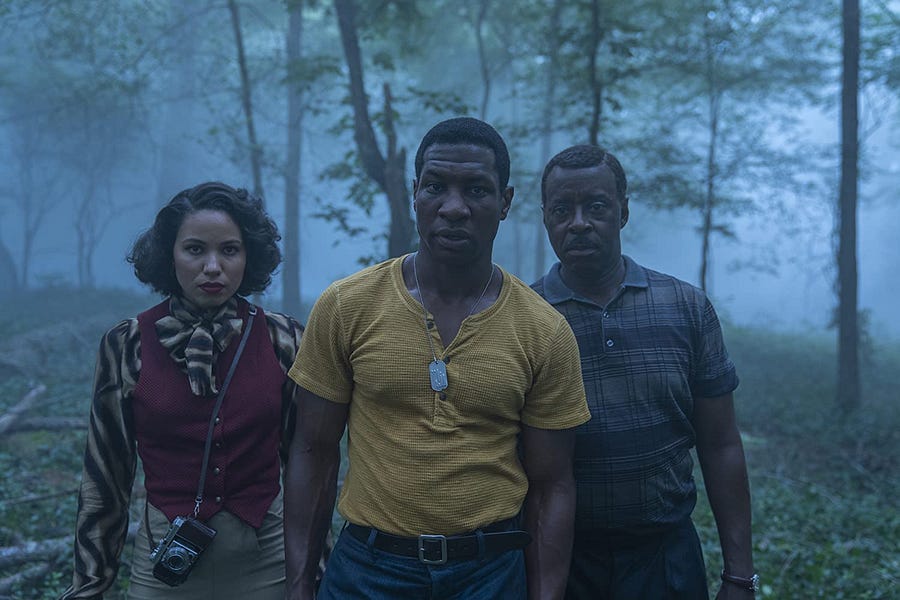Let’s start with an admission: I am not exactly the target audience for Lovecraft Country, the new supernatural horror show from HBO that debuted two weeks ago. One unfortunate middle-school gathering that involved watching Insidious with a blanket over my head and my hands on my ears left me with an aversion to the horror genre. But the premise intrigued me: Lovecraft Country explores the racism that plagued the United States in the 1950s with as much, if not more, of its horror coming from the racial injustice and violence the protagonists suffer than from the elements of Lovecraftian horror woven into the story. I thoroughly enjoyed HBO’s superhero miniseries Watchmen that similarly examined racism in America’s past through an unexpected genre, so I decided I’d see if Lovecraft Country could succeed on this front as well. With two episodes out right now—and the third airing tomorrow night—thus far it has.
The show’s lead is one Atticus “Tic” Freeman (Jonathan Majors), a young African-American veteran of the Korean War, who returns home to Chicago to find his estranged father has gone missing. His only clue is a mysterious letter his father sent him encouraging Tic to find him in what the bespectacled veteran initially misreads as “Arkham, Massachusetts,” the fictional setting for much of H.P. Lovecraft’s oeuvre. Tic’s uncle, George Freeman (Courtney B. Vance), reads the letter and corrects his mistake: His father claims he is in a town called Ardham. George writes travel books that guide black Americans through the country by informing them of safe towns, restaurants, and other businesses and warning them of which to avoid. He searches through all his maps and documents he’s accumulated in his work, only to find that Ardham hasn’t been on a map in more than two centuries, a finding that prompts uncle and nephew to set out in search of Ardham with Letitia “Leti” Lewis (Jurnee Smollett), a friend of Tic’s in need of a ride across the country. Along their quest to find Tic’s father, the trio is met with racism and horrific monsters ripped from the pages of Lovecraft’s stories.
It would be easy for the show’s intended messages about racism to be lost in the spectacle of Lovecraft horror stories. But the Lovecraftian elements allegorically reinforce them. Racism and horror are inextricably linked—in the first episode, Tic, George, and Leti are nearly lynched by the racist sheriff of a sundown county and his deputies. They’re taken out to the woods, only to be attacked by a pack of Shoggoths—a grotesque, bestial Lovecraft creation covered in eyes—that kill all the corrupt officers of the law and turn some of them into fellow monsters while Tic, Leti, and George narrowly escape.
The parallels are clear: Shoggoths, like the sheriff and his deputies, waited to attack until night and inspire fear not just through violence but because they infect and turn some of those they attack. It is not enough to merely hold Shoggoths or racists at bay, the show reminds us, care must be taken to prevent their numbers from multiplying, an important message at a time when hate crimes are at a 16-year high, internet conspiracies with racist undertones like QAnon are attempting to move mainstream, and racial tensions in America are ever growing. The second episode is about the importance of cultural memory and how complacency with inequality occurs when the horrors that created it are forgotten, with a magic, mind-wiping cult that attempts to exploit Tic in an occult ceremony serving as the metaphorical stand-in for racism. (The second episode completes the first narrative arc of the anthological show, so I won’t give away too much more here so as not to spoil anything terribly important to the plot.)
The more you think about repurposing (the rather blatantly racist) Lovecraft’s work in the manner that Lovecraft Country does, the cleverer it seems. We think of evil, all too often, as something shadowy and carried out by recognizably malevolent forces. Lovecraft Country reminds us this isn’t the case—oftentimes true evil takes a normal guise. And why should we be more disgusted by monsters or cults than racist townspeople or sheriffs? The racists may have a more normal appearance, but their actions are just the same and just as horrific.
Still from Lovecraft country by HBO.







Please note that we at The Dispatch hold ourselves, our work, and our commenters to a higher standard than other places on the internet. We welcome comments that foster genuine debate or discussion—including comments critical of us or our work—but responses that include ad hominem attacks on fellow Dispatch members or are intended to stoke fear and anger may be moderated.
You are currently using a limited time guest pass and do not have access to commenting. Consider subscribing to join the conversation.
With your membership, you only have the ability to comment on The Morning Dispatch articles. Consider upgrading to join the conversation everywhere.